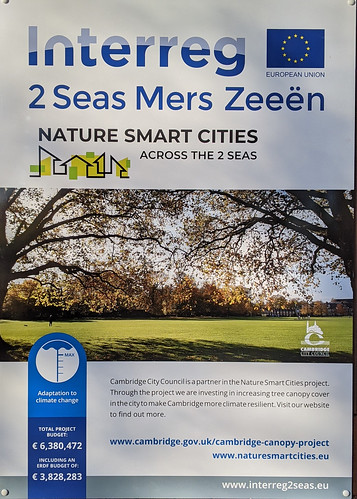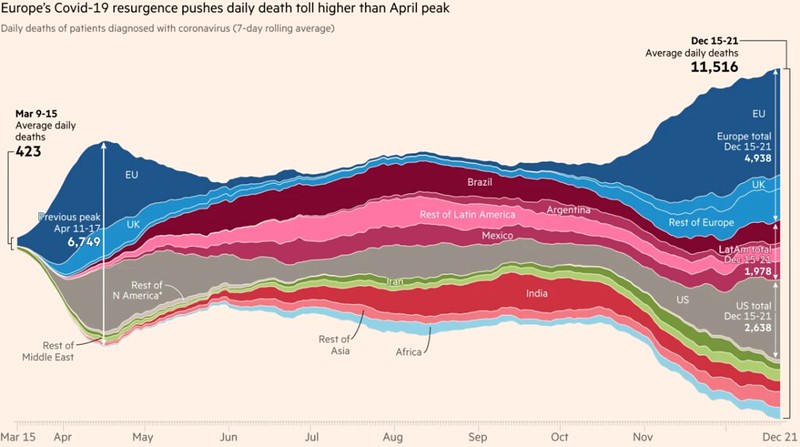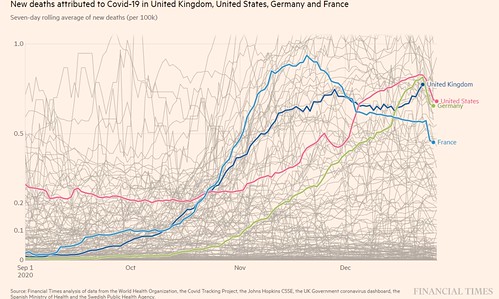 Prompted by an exchange on Titter beginning with that nice JA: a pandemic is such a problem for the right, as it's an existential threat to their entire philosophy of individualism. There's a lot of language clutter in there which is probably irremovable (I don't regard myself as part of the "right" but I am very keen on "individualism" re-written as "lack of coercion" or as "as opposed to tribalism") but the exchange continues with my CC can be (largely, in theory) solved by carbon tax; but it is hard to see a pandemic equivalent.
Prompted by an exchange on Titter beginning with that nice JA: a pandemic is such a problem for the right, as it's an existential threat to their entire philosophy of individualism. There's a lot of language clutter in there which is probably irremovable (I don't regard myself as part of the "right" but I am very keen on "individualism" re-written as "lack of coercion" or as "as opposed to tribalism") but the exchange continues with my CC can be (largely, in theory) solved by carbon tax; but it is hard to see a pandemic equivalent.The carbon tax part first, prompted by the-Ken-formerly-known-as-ATTP's not understanding my carbon taxes are ensuring that the costs of emissions are factored into those emissions; a subtle but important difference [from the idea that they are a payment for the damages]. I say "my" but the idea is of course not mine, and was transmitted to me by Timmy (via PeteB in that case, but I'm pretty sure there's a better example I failed to find). Also, disclaimer, IANAE. This is all part of prices-are-information theory. For most things, the price of the thing reflects the cost of making it (and marketing it, and so on) and you-the-consumer get to decide if that price is low enough for you to want to buy it. And so we have economically sane activity: things are bought (and therefore, are made) if there is demand, at price. But there are externalities, the most obvious of which is CO2, whose cost is not in the product. And so we risk economically insane activity: things being made, whose (total, true) cost is less than their sale price. Which is to say, the process destroys rather than creates value.
This version of the theory doesn't require govts to use the carbon tax proceeds for any particular cause... building windmills, paying for storm prevention, insulating homes, whatever. The other version, KR's which I shall unkindly call the "naive theory", is that the carbon tax is paying, in advance, for a cost that will be incurred. This is - I now think - a mistake, but one I've made before1. If it is a mistake, it should have some consequences; ideally I'd be able to say "but then when you apply it to this, it all goes wrong". But I think it is only a theoretical mistake; sort-of like the way using a Hamiltonian helps you to get from classical to QM physics.
Pandemics
The Covid pandemic rolls on, depressingly. There's a new strain, of greater transmissibility but as yet not-known-greater-damage; Cambridge(shire) is in tier 4, thus scuppering my plans to visit the Lakes (I say these things for context so that when I come back in years future I'll know about where we are).
But just as, in theory, a carbon tax is a liberty-preserving solution to GW, is there an equivalent to lockdowns (which greatly resemble, because indeed they are, regulation). JA offers In theory we could pay for people to isolate as required. That itself wouldn’t solve the problem but it would surely help but I think that's problematic (I think he intends this as a liberty-preserving solution, not as a solution; but I don't think it is. The liberty it doesn't preserve, in case it isn't visible at first sight, is of the people you'll have to take the money from). If you want the "std" answer (with the caveat that there isn't a std answer4) then I think the best presentation I've seen is Life-Years Lost: The Quantity and The Quality by Bryan Caplan. This attempts to use cost-benefit analysis3 to show that reaction2 to Covid has cost more than the unchecked pandemic would have cost (and was therefore a bad idea).
I don't know whether I believe it or not; I incline towards belief. The analogy I'd use - and argument from analogy is always valid, recall - to answer the inevitable "but people would die; life degraded through lower quality doesn't matter in the same way; you can't sum up lives" is with the inevitable reactions to protectionism: the benefits (preserving our jobs) are visible and accrue to obvious people; the losses (higher costs for everyone; bureaucracy; more govt) are diffuse and hard to see.
interreg
interreg isn't a thing I'm familiar with. My picture is of a poster - found on the kiosk on Jesus Green near the lock - which says there is an initiative to increase tree cover in Cambridge. I can't say I've noticed any such, or even that there are obvious ways to do so. It might draw a hollow laugh from the folks on Milton road who have tied yellow ribbons around their trees to protest plans to cut them down. But don't let me be too negative; there may be some as-yet-unperceived value in the scheme. Indeed this bit is part of Nature Smart Cities across the 2 Seas programme and specifically the Cambridge bit is Cambridge Canopy Project: the average tree canopy cover figure is 16% in England. Cambridge currently has 17% tree canopy cover. We are working to increase this to 19%, which will need more than 800,000m2 of new tree cover.
Update: Schadenfreunde
Probably a mistake, but I can't resist. At the time of the initial outbreaks, much was made of the incompetence of the right-wing US and UK govts in contrast to the more successful socialist responses of various countries, most notably Germany. But that success - though you could note various factors that made it plausible - was always a bit mysterious, and has fallen apart recently. Though I've left it long enough that they're back below us now (although possibly the over-Christmas data isn't totally reliable, and the sharp falls from US, Germany and France might be spurious). And yes, if you count cumulative deaths then Germany has done significantly better.
Update: economics and morality
The Twitter conversation continues as, apparently, a sequence of misunderstandings on my part: see the conversation, perhaps ending at KR's All I really mean is that how we assess the costs cannot really be done in a truly value-free way. So, even if we do decide to estimate the price of carbon emissions and to then use that to set a carbon tax, this is not a value-free assessment. With which I have no disagreement. Some aspects of economic costs of GW are explicitly value judgements: how much do we value lost mountain glaciers? And some are value judgements, but wrapped in economics: if we lose winter skiing, how many jobs are lost? The latter is more measureable, but still value judgements, because the choices of the people that wanted to go skiing are inevitably part of the economics.
You might - if you have a decent memory - object that this contradicts my earlier That it is easier to agree on economics than morality and in some ways it does, or at least pushes against it. And so - given that there are people who would make the mistake of calling economics value-free - it isn't unreasonable for KR to make this point. I'll paraphrase what I said at Morality and economics: I don’t, of course, mean to suggest that it is entirely an economic and not at all an ethical problem. I mean to suggest (see aforementioned post) that thinking about it primarily as ethical [value-judgement] is unhelpful.
Update: FT's sausage pic
Updated, in response to CIP's comment, the FT's "sausage" pic, which to me shows that initially it was all EU and US; in the middle, EU dwindles to nothing and the US is a small proportion of the global total; and now Europe plus US is 60+% ot the total whilst everyone else is sort-of stable. Admittedly, these are reported, so perhaps it is possible that Europe and US are better at the reporting; but I can't see how that explains it all.

Refs
* Congratulations to James and Jules for being part of Science breakthrough of the year (runner-up).
* Donald Trump's influence will evaporate once he leaves office. Here's why; Julius Krein, in the Graun. This is close to what I think, but few others seem to be saying; our celeb-obsessed news world, sez I. Trump, out of power, will fade away; and doesn't have the staying power to regroup for 2024.
* Not even half-way there - JA
* New Year Wish: Political Wars of Religion? by Pierre Lemieux - the will of the People
* The Biden Administration Just Failed its First Science Integrity Test; Pricing carbon makes good sense but should not come at the expense of scientific integrity; by Roger Pielke Jr.
* Shipping now faces the highest price on carbon for any global industry
Notes
1. Also I have a feeling that when I said this before, Richard Tol said no, it was also paying for damages, so if you prefer you may take his viewpoint with some degree of support.
2. An analogy that he doesn't make is the immune system's allergic response.
3. See my failed attempt to propose similar.
4. Another is Lockdowns and the Presumption of Liberty by Don Boudreaux; or Nice vaccine; pity there's no distribution mechanism by Scott Sumner

